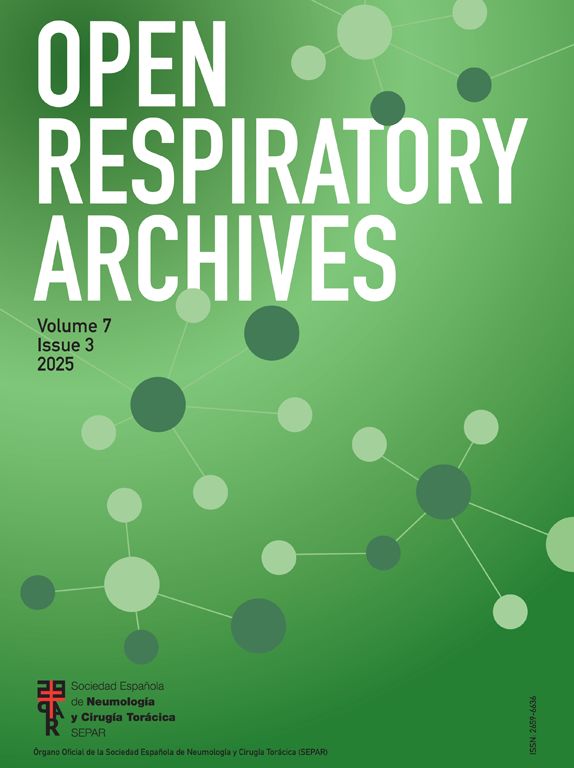The clinical presentation and outcomes of acute COVID-19 are well described. Most patients have mild disease and only a minority need hospital admission. In most cases, patients experience a complete resolution of their symptoms after 2–6 weeks, but a subgroup present long lasting symptoms.1 Post-COVID-19 condition occurs in individuals with a history of probable or confirmed SARS CoV-2 infection, usually 3 months from the onset of COVID-19 with symptoms and that last for at least 2 months and cannot be explained by an alternative diagnosis.2 Fernández de las Peñas et al.3 have proposed the following integrative classification for post-COVID symptoms: potentially infection related-symptoms (up to 4–5 weeks), acute post-COVID symptoms (from week 5 to week 12), long post-COVID symptoms (from week 12 to week 24), and persistent post-COVID symptoms (lasting more than 24 weeks).
Now, it is no doubt that current and past smoking produces a more severe clinical form and worse progression of COVID-19. Undoubtedly, smoking is an independent risk for having progression of COVID-19, including mortality, and people who smoke being at an increased risk of developing symptomatic COVID-19.4,5
So, the question now is, are smoking and vaping an independent risk factor of developing long and persistent post-COVID-19? Whitaker et al.6 in a recent and large study whose objective was to estimate the prevalence and identify predictors of persistent symptoms (lasting 12 weeks or more) of long COVID-19 found that female sex, increasing age, obesity, smoking, vaping, hospitalization with COVID-19, deprivation, and being a healthcare worker are associated with higher probability of persistent symptoms. Emecen et al.7 have found the same because in his multivariate analysis older age, female gender (OR 1.74, 95% CI 1.57–1.93), bad economic status (OR 1.37, 95% CI 1.14–1.65), current smoking (OR 1.15, 95% CI 1.02–1.29), being fully vaccinated before COVID-19 (OR 0.53, 95% CI 0.40–0.72), having more health conditions (≥3 conditions, OR 1.78, 95% CI 1.33–2.37), having more symptoms (>5 symptoms, OR 2.47, 95% CI 2.19–2.78), and hospitalization (intensive care unit, OR 2.18, 95% CI 1.51–3.14) were associated with reporting of symptoms within 6 months after diagnosis of COVID-19. Desgranges et al.1 in a study whose objective was characterize the post-COVID-19 syndrome after mild COVID-19 and identify predictors found that active smoking was a predictor of memory impairment. Hossain et al.8 have identified smoking, among others, as a key predictor for the presence of long COVID-19, in terms of associated risk factor and also as a risk factor that was associated with a longer duration of long COVID illness. Not all studies have found the same.9
Smoking has also been related to the development of pulmonary fibrosis in patients with COVID-19, since these findings are more frequent in more severe patients who were admitted to the intensive care unit (ICU) and required mechanical ventilation, and it is known that smoking and asthma are associated with a greater risk of ICU admission and mortality.10
After the above, we wanted to take the opportunity to recommend smokers and vapers to stop using it, as this would prevent them from acquiring SARS-CoV-2 infection, thus reducing the risk of developing a prolonged and persistent post-COVID-19 as well as worse progression and greater severity of the acute COVID-19 disease. We can say that smoking and vaping are not only a risk factor of a more severe clinical form and worse progression of COVID-19 but both are also a risk factors for the development of long and persistent post-COVID-19.
Authors’ contributionsJIG-O: conception, writing the core content of the study, drafting the article and revising it critically. SS-R, CAJ-R: critical review of the manuscript. All authors approved the current version of the manuscript.
FundingNo funding.
Conflicts of interestThe authors declare not to have any interest conflicts. José Ignacio de Granda Orive is part of the Editorial board of Open Respiratory Archives and declares that they have remained outside the evaluation and decision-making process in relation to this article.




